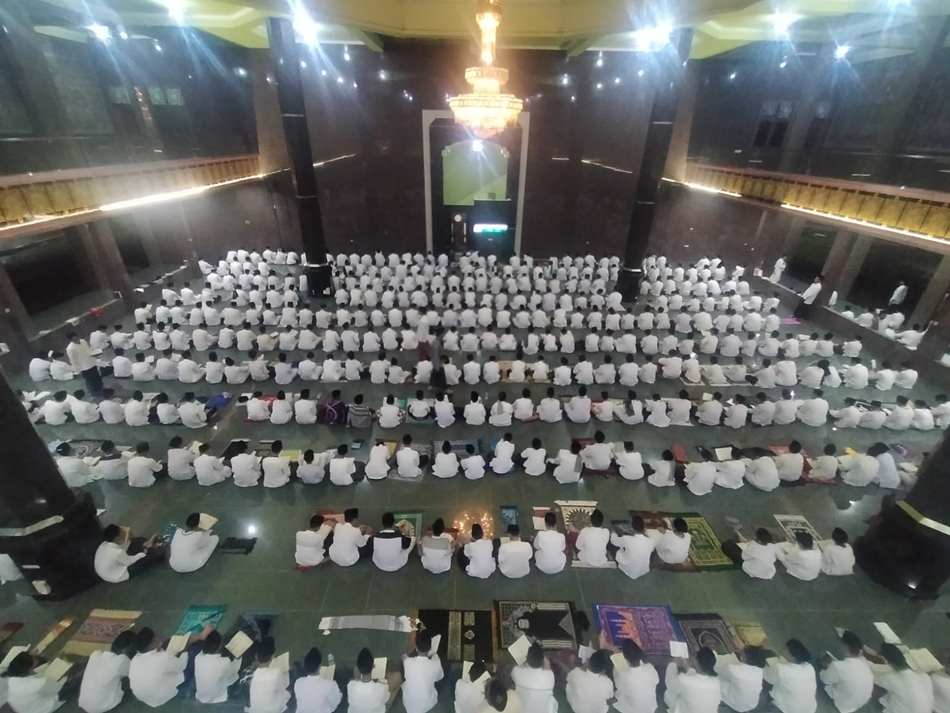Tawadhu‘ is humble and not arrogant. According to the meaning of tauhid, tawadhu‘ means that we do not view ourselves as having more value than other servants of Allah SWT. For example, feeling smarter, feeling richer, and in a higher position. In theTreatise of al-Qusyairiyah, it is stated that Abu Yazid al-Busthami said about tawadhu‘, “A person who does not view himself as having a position and not as a real condition, and does not view other people as inferior.”

All values such as sincerity, patience, piety, tawadhu‘, and others, which judge not us but other people–even though they are not necessarily true. Everything returns to Allah SWT. who knows the truth. Allah SWT. said:
ۚ فَلَا تُزَكُّوْۤا اَنْفُسَكُمْ ۗ هُوَ اَعْلَمُ بِمَنِ اتَّقٰى
So do not claim yourselves to be pure; He is most knowing of who fears Him.(QS. An Najm [53]:32)
Only Allah SWT. who knows the degree of piety of His servants. Therefore we must not be arrogant. Must be humble. Nor do you expect praise from other people, because it will invalidate your attitude of humility and sincerity. For example, there is someone who has been diligent in giving charity for 10 years. Then one day he revealed it to other people in order to get praise, then the value of tawadhu‘ and his sincerity were lost. There is an element of bragging and showing off, albeit subtly. Therefore, if we have not been able to keep our hearts humble, even though the aim is to inspire and motivate, it is better not to express it. Because it is feared that it will be tarnished by the emergence of arrogance without realizing it.
Tawadhu‘ and sincerity cannot be separated. Because it is impossible for people to be tawadhu‘ if they are not sincere. The practices and character of the heart are not easy and must be truly guarded. The Sufis really guard against things that damage tawadhu‘ and sincerity from elements that are haram. Worried about this, they acted wara‘ (careful). They protect themselves from haram elements. Therefore, if one of our children is naughty, perhaps there is something in their body that is not halal. There is hellfire there, it is hot, so that arrogance, arrogance and defiance emerge.
Tawadhu‘ does not mean hiding the blessings of Allah SWT. such as knowledge, wealth, and others. Sharing knowledge and wealth also means tawadhu‘ because you realize that everything belongs to Allah SWT. Realizing that we have nothing, but Allah SWT. who has everything. Therefore, sharing knowledge, wealth and other things that are beneficial to others is an attitude of tawadhu‘ for the blessings of Allah SWT.
In speaking, in seeking knowledge, in doing good deeds we must always be humble’. Don’t elevate yourself for critical reasons. Because being critical is not being arrogant and feeling smart. Here it is necessary to distinguish between critical thinking and critical attitude. Critical thinking means being able to understand a problem and see it from various points of view, seeing the advantages and disadvantages of each answer, even errors and contradictions. From there, then try to find other alternative solutions to the problem. If we have this kind of critical thinking, that’s fine.
Meanwhile, a critical attitude is more about etiquette and politeness, such as a cynical and condescending attitude. This is wrong. You should still maintain akhlaq al-karimah. So his thinking is critical, his people remain polite, tawadhu‘. Why is it then that many people have a critical attitude, but their minds are not critical, they are empty, they have no knowledge. Meanwhile, people who are humble, have knowledge. His mind is critical, his manners are tawadhu’. So knowledge was attached to him. On the other hand, for those who have no manners and are arrogant, knowledge will not stay by their side.
Abu Yusuf Akhmad Ja’far in Khulashah Ta’zhim al-‘Ilm explains that when seeking knowledge, manners must be maintained. Knowledge is only appropriate for those who practice their etiquette, both to themselves, their teachers and their friends. People who have manners have the right to possess knowledge, so knowledge is humble for them. As for people who do not have manners, then knowledge is too great to stay by their side.
There are three stages of knowledgeable people, as mentioned by Umar ibn al-Khattab. This is a warning so that we avoid the wrong stage. The first stage, he will be arrogant. The second stage, he will be tawadhu‘. The third stage, he will feel like he is know nothing.
In the first stage, you feel like you know a lot, even though you still know little. In the second stage, he begins to know a lot, but feels little, so he is humble. In the third stage, you feel like you don’t know anything. Let’s take Mr. Habibie as an example, he is smart but not arrogant. Even though he has created useful innovations. His intelligence has benefited many people. He is still not arrogant. So we have to be humble even though other people praise us. Because the praise belongs to Allah SWT. The advantages we have come from Allah SWT. So it’s not appropriate to be arrogant.
Allah SWT. will raise the status of those who believe and have knowledge by several degrees. There is an element of tawadhu‘ which is related to faith. This is as stated by Allah SWT.
يَرْفَعِ اللّٰهُ الَّذِيْنَ اٰمَنُوْا مِنْكُمْ ۙ وَا لَّذِيْنَ اُوْتُوا الْعِلْمَ دَرَجٰتٍ ٌ
Allah will raise those who have believed among you and those who were given knowledge (Al-Mujādalah [58]:11)
Faith elevates a person’s status in the sight of Allah SWT. and in the afterlife. Meanwhile, knowledge elevates a person’s status in the world. People who believe and have knowledge have a noble rank in the sight of Allah SWT. both in this world and in the afterlife. So, the two, faith and knowledge, cannot be separated. And the knowledge of believers contains elements of tawadhu‘ so that their knowledge is useful and raises their status even more.
